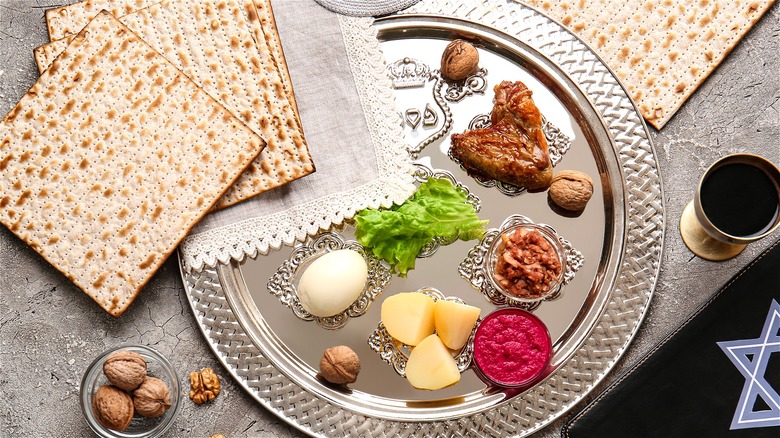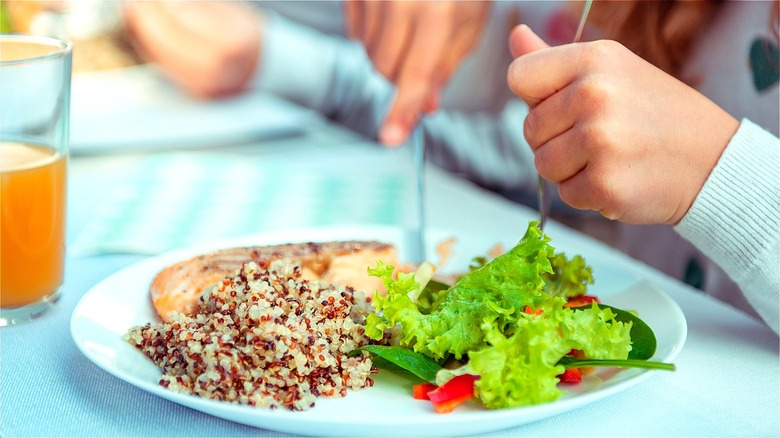Is Quinoa Considered Kosher For Passover?
Among the many Jewish holidays in one calendar year, Passover has a range of rules regarding acceptable foods for consumption. For 7 to 8 days in late April, Jews pay homage to their escape and liberation from Egyptian slavery thousands of years ago. During this long arduous journey to freedom, Israelites didn't have time to pack leavened bread. Therefore, most present-day Jewish families abstain from eating bread products or Chametz as part of the Passover celebration. Yet, the food rules regarding Passover are a little more complicated than skipping your morning bagel and weekly Pullman bread recipe.
Those who celebrate Passover traditionally avoid any wheat, rye, or oat products that have been combined with water and allowed to ferment and rise. Some Jews are stricter with their allowances and also abstain from eating dried legumes and rice or kitniyot. If you're looking for a kosher, gluten-free carb for the upcoming holiday you may have considered giving quinoa a try.
According to Healthline, quinoa is a South American whole grain packed with protein, fiber, and essential vitamins like Manganese, Magnesium, and Phosphorus. Whether you abstain from leavened bread products only or follow the Ashkenazic custom of including kitniyot in your restrictions, quinoa is typically considered a kosher-safe option for many Jewish families. However, not everyone who celebrates Passover, particularly those who avoid beans, seeds, and rice, views quinoa as a kosher-safe food.
Depending on your religious convictions, quinoa is a viable kosher-safe option for Passover
The ultimate guide to Passover food traditions is extensive, yet there isn't a one-size-fits-all rule regarding the consumption of quinoa. Healthline claims quinoa is a pseudo-grain meaning it's prepared and consumed like other popular whole grains and rice yet the difference is that quinoa is 100% gluten-free and technically a seed. According to the general food restrictions surrounding Passover, Jews are to avoid eating any leavened bread products made from wheat, rye, spelt, barley, and oats since they can ferment and become Chametz.
However, for the portion of Jews who do not consume seeds, beans, lentils, or kitniyot, quinoa might be avoided based on environmental factors that can't be conclusively devised. For starters, some Ashkenazic Jews believe beans and seeds can be mistaken for the 5 primary grains that can be made into Chametz. A bowl of cooked quinoa may look and seem like one of the 5 major grains, therefore may be restricted to avoid confusion. Second, this pseudo-grain could be grown in a field near whole grains, covered with oats or barley to keep pests at bay, or processed in a facility that also packages commercial whole grains. These external factors may cause some families to question whether or not this pseudo-grain is indeed kosher. If you avoid eating kitniyot during Passover, consulting with your rabbi and purchasing kosher-approved quinoa may resolve any apprehension regarding its consumption.
How to prepare kosher-approved quinoa for Passover
Luckily, there are certifying organizations in the U.S. that label quinoa kosher as long as it's processed in a facility separate from whole grains. Also, since quinoa is not on the official list of kitniyot foods, many find the pseudo-grain safe to consume on the Passover holiday. While basic quinoa can be cooked over your stove in just 15 minutes, there are many delicious ways you can incorporate this nutritious food into your Passover feast this Spring.
Quinoa is quite versatile and has an earthy mild taste that pairs well with different ingredients. Why not make a delicious appetizer by filling mushroom caps or zucchini boats with seasoned cooked, quinoa? Next to serving this versatile grain with the usual gelfilte fish in white wine-herb broth, you can give the vast majority of your favorite meaty Passover dishes a carb-loaded boost with quinoa by adding in your favorite dried fruits and fresh herbs.
Alternatively, instead of solely focusing on ways to cook up quinoa for your annual Seder feast, you can also incorporate quinoa into your day-to-day breakfast menu by adding a spoonful to hearty breakfast salads composed of greens and hard-boiled eggs. You can also make sweet breakfast bowls by serving quinoa with chopped nuts, dried fruit, and cinnamon. Many Jews find quinoa to be a versatile kosher-safe option to enjoy during Passover. If you have concerns, purchase only Kosher-certified quinoa or talk directly with a Jewish mentor or rabbi.


